
Musica Oral del Sur
Scope & Guideline
Advancing Scholarship in Oral Musical Practices
Introduction
Aims and Scopes
- Ethnographic Studies of Music:
The journal emphasizes ethnographic research, investigating the lived experiences and cultural practices surrounding music in various communities, particularly in southern regions. - Historical Contextualization:
Many articles provide historical analyses of musical forms and institutions, tracing their evolution and influence over time, such as the study of the 'Concurso de Cante Jondo' or the history of music in Granada. - Cultural Intersections and Influences:
The journal explores how different musical traditions intersect and influence each other, including studies on Sephardic songs and the impact of cultural stereotypes in media. - Gender and Social Issues in Music:
There is a strong focus on the role of gender in music, examining themes of empowerment and representation, particularly in flamenco and other traditional forms. - Analytical and Theoretical Frameworks:
The journal also includes analytical studies of musical structures and styles, using various theoretical frameworks to deepen the understanding of musical phenomena.
Trending and Emerging
- Cultural Appropriation and Authenticity:
Recent publications increasingly address issues of authenticity and cultural appropriation in music, particularly in genres like flamenco, highlighting tensions between tradition and modern reinterpretations. - Impact of Technology on Music Consumption:
The rise of electronic dance music and its cultural implications has become a significant focus, with studies examining how technology alters musical experiences and community engagement. - Gender Studies in Music:
There is a growing trend towards exploring gender dynamics in music, particularly in traditional genres like flamenco, as seen in works addressing feminist perspectives and women's roles in music. - Music and Social Issues:
Themes exploring music as a vehicle for social commentary, particularly in contexts like drug trafficking and cultural stereotypes in media, are gaining traction, reflecting a broader interest in music as a form of activism. - Interdisciplinary Approaches:
The journal is increasingly publishing works that combine musicology with other disciplines, such as anthropology, sociology, and cognitive science, to provide richer, more nuanced analyses of musical practices.
Declining or Waning
- Traditional Musical Forms:
There has been a noticeable decline in studies focusing solely on traditional musical forms without contemporary context. Earlier works emphasized pure traditional practices, but recent publications tend to integrate contemporary influences. - Historical Biographies of Lesser-Known Musicians:
While historical studies are still present, there is a waning interest in detailed biographies of lesser-known musicians. Instead, the focus has shifted towards broader cultural narratives and significant historical figures. - Purely Technical Musicology:
The journal appears to be moving away from purely technical analyses of music, such as strict music theory applications, towards more interdisciplinary approaches that include social and cultural contexts. - Regionalism Without Global Context:
There is less emphasis on regional music studies that do not relate to broader global influences. Recent articles tend to contextualize local music within global trends, reducing the focus on isolated regional studies.
Similar Journals

Resonancias
Innovating Perspectives in Music Studies.Resonancias is a distinguished open-access journal published by the Pontificia Universidad Católica de Chile, dedicated to advancing the field of music studies. With an ISSN of 0717-3474 and an E-ISSN of 0719-5702, this journal has been promoting scholarly discourse in music since its transition to open access in 2014. Resonancias serves as a critical platform for researchers, professionals, and students alike, enabling them to disseminate knowledge and explore innovative perspectives in musicology. With its current Q2 ranking in the field of music as of 2023, and a Scopus ranking of #108 out of 180, this journal exemplifies its commitment to quality and impact within the academic community, fostering an accessible database of music research from Chile and beyond. Situated at AVENIDA VICUNA MACKENNA 4860, MACUL, SANTIAGO, CHILE, Resonancias not only promotes original research but also includes critical reviews, interviews, and essays that contribute to the rich tapestry of musical knowledge.

RIVISTA ITALIANA DI MUSICOLOGIA
Unveiling the Rich Tapestry of Musical KnowledgeRIVISTA ITALIANA DI MUSICOLOGIA, published by the Italian Society of Musicology, is a distinguished journal dedicated to the field of musicology, offering a platform for scholarly research and discourse on a wide array of musical topics. With an ISSN of 0035-6867 and an E-ISSN of 2036-5586, this journal has contributed significantly to the understanding of music in cultural and historical contexts. Although the scope of coverage was marked from 2003 to 2008 in renowned databases like Scopus, the journal continues to serve as an invaluable resource for researchers, educators, and students embroiled in music studies. Its emphasis on rigorous research and critical analysis makes it a vital asset for anyone seeking to deepen their knowledge of musicological inquiry. While not an open-access publication, the RIVISTA ITALIANA DI MUSICOLOGIA remains a prestigious outlet for scholarly contributions that reach audiences eager to explore the complexities of musical heritage.
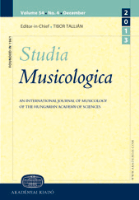
Studia Musicologica
Exploring the Harmony of Cultures through MusicologyStudia Musicologica, published by AKADEMIAI KIADO ZRT, stands as a leading journal in the field of musicology, dedicated to the exploration and analysis of music across diverse cultures and historical contexts. With its ISSN 1788-6244 and E-ISSN 1789-2422, this journal provides an essential platform for disseminating high-quality research and critical analyses, thereby contributing significantly to scholarly discourse in music studies. Although it operates on a traditional access model, its rigor and foundational contributions ensure that it remains invaluable for researchers, professionals, and students alike. Situated in the heart of Hungary, Studia Musicologica engages with a broad spectrum of topics including music theory, ethnomusicology, and music history, fostering a deeper understanding of music's multifaceted role in society. This makes it an essential resource for anyone interested in advancing their research or professional practice within the expansive field of musicology.
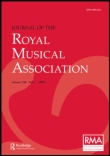
JOURNAL OF THE ROYAL MUSICAL ASSOCIATION
Cultivating a deeper understanding of musical artistry.JOURNAL OF THE ROYAL MUSICAL ASSOCIATION, published by Cambridge University Press, stands as a significant repository for innovative research and scholarly discourse within the field of music studies. Recognized for its contributions to the understanding of musical practices, theory, and history, this esteemed journal offers a platform for academics and researchers to disseminate their findings to a broad audience. With an ISSN of 0269-0403 and E-ISSN of 1471-6933, the journal has maintained a notable presence since its inception, merging insights from both traditional and contemporary musicology. It currently occupies a Q4 ranking in Music within the Scopus database, reflecting its inclusion within the arts and humanities landscape. While the journal traditionally operates under subscription access, its continuing commitment to advancing music scholarship ensures that it remains an essential resource for students, scholars, and practitioners alike, fostering greater understanding and appreciation of musical artistry from 1987 to the current era.
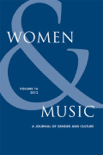
Women and Music-A Journal of Gender and Culture
Unveiling the Rhythm of Women's Experiences in MusicWomen and Music: A Journal of Gender and Culture is a pioneering academic journal published by University of Nebraska Press, focusing on the intersection of gender and music. With a commitment to exploring issues pertinent to women and music in a range of cultural contexts, this journal provides a critical platform for scholars, musicians, and educators to share research that enriches our understanding of gender dynamics within the music industry and music's role in society. While currently not an open-access journal, it aims to make significant contributions to gender studies, cultural studies, and musicology, attracting a dedicated readership from various backgrounds. The journal is essential for those interested in feminist musicology and gender representation in the arts, fostering discourse that challenges traditional narratives and promotes inclusive scholarship. By bringing together diverse perspectives and innovative research, Women and Music continues to push boundaries and foster important conversations within both academic and artistic communities.
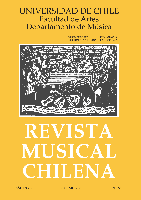
Revista Musical Chilena
Advancing Scholarship in Music and Cultural StudiesRevista Musical Chilena, an esteemed publication from the Faculty of Arts at Universidad de Chile, has been a pivotal platform in the field of music and cultural studies since its inception in 1945. With a commitment to open access, this journal promotes the dissemination of innovative research and critical discourse that bridges the gap between cultural theory and musical practice. Holding a notable Q2 ranking in both the Cultural Studies and Music categories as of 2023, it serves as a vital resource for scholars and professionals alike. The journal's inclusion in the Scopus database, with rankings that reflect its influence in the arts and humanities, underscores its significance in shaping the contemporary landscape of music studies. Given its convergence of research output from 2007 to 2024, Revista Musical Chilena continues to engage its audience with diverse scholarship that reflects Chilean musical heritage and global cultural dynamics.

Oido Pensante
Exploring the Soundscape of Cultural StudiesOido Pensante is a prominent open-access journal dedicated to the multifaceted field of music, published by the esteemed University of Buenos Aires, specifically through its Faculty of Philosophy and Letters, Institute of Anthropological Sciences. Since its inception in 2013, this journal has fostered a rich platform for scholarly discourse and innovative research at the intersection of music and cultural studies. With an ISSN of 2250-7116, Oido Pensante aims to bridge theoretical frameworks and practical applications, making significant contributions to the understanding of music in its social context. Currently, it holds an impressive Q3 ranking in the Arts and Humanities – Music category for 2023, with a Scopus rank of #99 out of 180 journals, reflecting its commitment to academic rigor and relevance. The journal's open access policy ensures that research is widely disseminated and accessible, making it an invaluable resource for researchers, professionals, and students alike in Argentina and beyond. With converged years from 2017 to 2024, Oido Pensante continues to expand its reach, encouraging intellectual exchange and stimulating dialogue within the music community.

MUSIKFORSCHUNG
Bridging Historical and Contemporary Musical InsightsMUSIKFORSCHUNG is a distinguished journal in the field of music studies, published by NEUWERK-BUCH UND MUSIKALIENHANDLUNG in Germany. With its ISSN 0027-4801, the journal caters to scholars, practitioners, and students interested in the diverse realms of musicology. Although it is currently not an Open Access publication, MUSIKFORSCHUNG plays a vital role in the academic landscape by disseminating research and critical discourse on music from various historical and contemporary perspectives. The journal has established its worth in the academic community, being categorized in the Q4 quartile in Music for 2023 and holding a rank of #169 out of 180 in the Scopus Arts and Humanities Music category, placing it within the 6th percentile. With publication activities spanning from 2002 to 2013 and resuming in 2016 through to 2024, MUSIKFORSCHUNG continues to be a crucial resource for those dedicated to advancing music scholarship. Set in the cultural heart of Kassel, Germany, the journal invites contributions that foster an understanding of music's impact on society and culture.
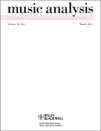
MUSIC ANALYSIS
Advancing the Art of Music ScholarshipMUSIC ANALYSIS, published by WILEY, is a prestigious journal in the field of musicology, recognized for its critical contributions to the analysis of music and its myriad influences on culture and society. With an ISSN of 0262-5245 and an E-ISSN of 1468-2249, this journal has established itself as a vital resource for researchers, professionals, and students alike, boasting a Q1 ranking in the 2023 category of Music. As part of a highly competitive field, it ranks 70th out of 180 in the Arts and Humanities Music category on Scopus, positioning it within the 61st percentile. MUSIC ANALYSIS serves as an essential platform for innovative research and insightful discourse, engaging with musical theory, practice, and education from 1996 to 2024. Its commitment to fostering rigorous scholarship makes it indispensable for those seeking to deepen their understanding of music and its analytical frameworks. Although it does not offer Open Access options, its relevance and impact in the genre ensure accessibility through institutional subscriptions and university libraries.

MUSICAL TIMES
Delving Deep into the Art and Science of MusicMUSICAL TIMES is a distinguished journal dedicated to the exploration and dissemination of scholarly works in the realm of music, serving as an essential resource for researchers, professionals, and students alike. Published by MUSICAL TIMES PUBLICATIONS LTD, this journal has built a robust reputation within the arts and humanities, specifically focusing on music studies, with an impactful reach indicated by its Scopus ranking at #73 out of 106 in the field. Though access to this journal is not open, its curated content, which spans various facets of musicology and contemporary music discourse, enriches the academic community by encouraging insightful discussions and critical analyses. With its historical roots tracing back to its inception, MUSICAL TIMES aims to foster a deeper understanding of music's cultural, social, and artistic dimensions, making it a valued publication for those engaged in the scholarly pursuit of music.